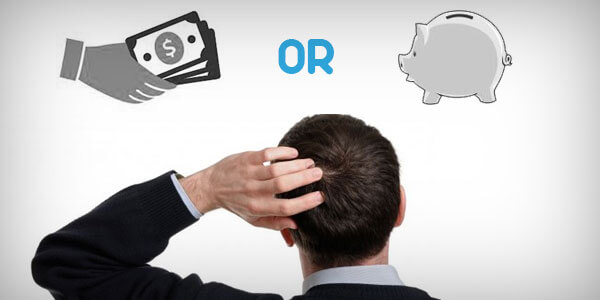Apparently, it’s common sense that is enough to assume any basic financial decisions. However, common sense may not always come to rescue when money-matters become intricate. For instance, when it comes to choose between saving money and paying off debt, your common sense probably won’t give the right answer.
Just millions of people like you have outstanding debt and inadequate savings. So whenever a rare bit of additional funds appear out of nowhere, you go puzzled as to how to use the extra bucks. Should you use that money to pay down your debts? Save it as an emergency fund? Or, keep for long term goals like retirement or getting a permanent address?
Think about the following suppositional situation: You have just $100 in your savings account from which you’re getting half of a percent in interest, and there is a credit card with a $3000 in balance on which you’re being charged 15% interest. Now if you receive a surprising tax refund of $1500, what would you do with that money?
Concluding with one could be a bit critical than what you might have thought of. It all depends on your financial condition, the type of debt you’ve, and on your future plans - what you want to do with your savings.
Does common sense always work?
No, it doesn’t. If you use your common sense, you’d certainly use that additional $1500 towards your credit card balance since your credit card is charging you a lot more in interest than what you’re earning from your savings account.
Now, here is a problem. Even if you use the refund to pay off your debts, you will still owe $1500 in credit balance and moreover, your savings will be $100 only. Now, what would you do if faced with an unexpected expense? What if your refrigerator or television breaks down? There would be no option other than to use your credit card and getting back to the situation where you were before. If you don’t give priority to your savings, you’ll always remain dependent on credit.
So what is the cure for your debt problems?
The only cure for your debt problems is savings. Debt is just like an epidemic that plagues your financial health. If your savings is not strong enough, you won’t be able to put a dent in your debt. If you don’t pay any heed to your savings and thrive on credit, you’ll always spend more than you earn. Once you stop using credit and moreover, allocate a certain portion of your paychecks to savings, I’m certain that you’ll spend less and as a result, would never be in debt.
Should you pay off debt or save money?
The answer is do both. To my best belief, if you are trying to get out of debt once and for all, you should build your savings and at the same time, pay off your debts. However, once you frame a substantial amount of savings - say $1,000, you can stop putting more money towards your savings account. Take control of your finances now if you really want to improve your financial health.
Whatever it might be, if you don’t have that financial or mental strength, focusing on resolving one is always better than doing neither.









